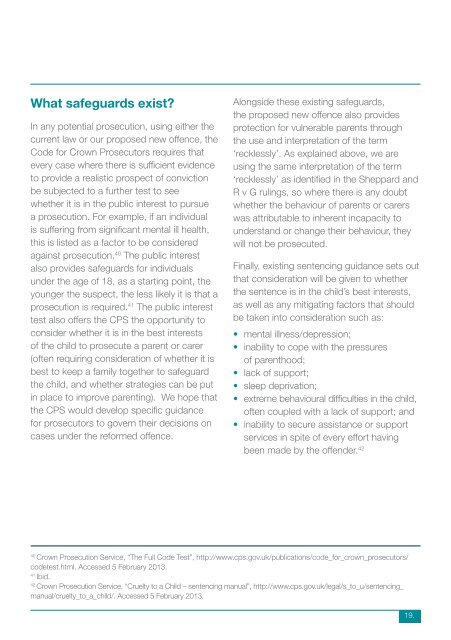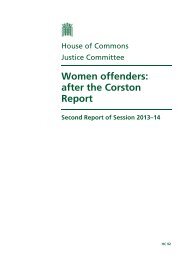The criminal law and child neglect: - Action for Children
The criminal law and child neglect: - Action for Children
The criminal law and child neglect: - Action for Children
- No tags were found...
Create successful ePaper yourself
Turn your PDF publications into a flip-book with our unique Google optimized e-Paper software.
What safeguards exist?In any potential prosecution, using either thecurrent <strong>law</strong> or our proposed new offence, theCode <strong>for</strong> Crown Prosecutors requires thatevery case where there is sufficient evidenceto provide a realistic prospect of convictionbe subjected to a further test to seewhether it is in the public interest to pursuea prosecution. For example, if an individualis suffering from significant mental ill health,this is listed as a factor to be consideredagainst prosecution. 40 <strong>The</strong> public interestalso provides safeguards <strong>for</strong> individualsunder the age of 18, as a starting point, theyounger the suspect, the less likely it is that aprosecution is required. 41 <strong>The</strong> public interesttest also offers the CPS the opportunity toconsider whether it is in the best interestsof the <strong>child</strong> to prosecute a parent or carer(often requiring consideration of whether it isbest to keep a family together to safeguardthe <strong>child</strong>, <strong>and</strong> whether strategies can be putin place to improve parenting). We hope thatthe CPS would develop specific guidance<strong>for</strong> prosecutors to govern their decisions oncases under the re<strong>for</strong>med offence.Alongside these existing safeguards,the proposed new offence also providesprotection <strong>for</strong> vulnerable parents throughthe use <strong>and</strong> interpretation of the term‘recklessly’. As explained above, we areusing the same interpretation of the term‘recklessly’ as identified in the Sheppard <strong>and</strong>R v G rulings, so where there is any doubtwhether the behaviour of parents or carerswas attributable to inherent incapacity tounderst<strong>and</strong> or change their behaviour, theywill not be prosecuted.Finally, existing sentencing guidance sets outthat consideration will be given to whetherthe sentence is in the <strong>child</strong>’s best interests,as well as any mitigating factors that shouldbe taken into consideration such as:• mental illness/depression;• inability to cope with the pressuresof parenthood;• lack of support;• sleep deprivation;• extreme behavioural difficulties in the <strong>child</strong>,often coupled with a lack of support; <strong>and</strong>• inability to secure assistance or supportservices in spite of every ef<strong>for</strong>t havingbeen made by the offender. 4240Crown Prosecution Service, “<strong>The</strong> Full Code Test”, http://www.cps.gov.uk/publications/code_<strong>for</strong>_crown_prosecutors/codetest.html. Accessed 5 February 2013.41Ibid.42Crown Prosecution Service, “Cruelty to a Child – sentencing manual”, http://www.cps.gov.uk/legal/s_to_u/sentencing_manual/cruelty_to_a_<strong>child</strong>/. Accessed 5 February 2013.19.
















